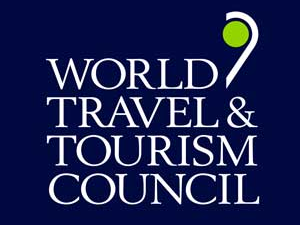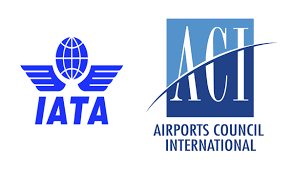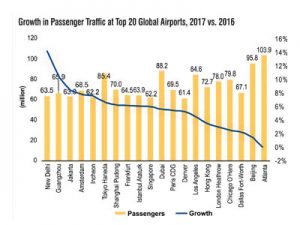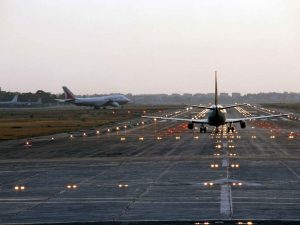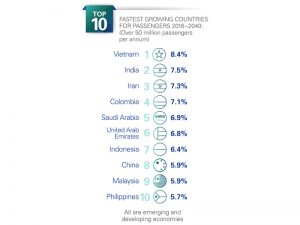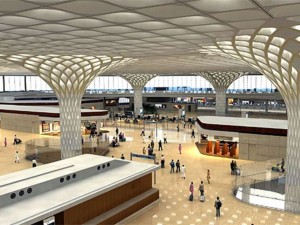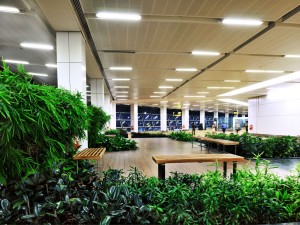WTTC has unveiled the second phase of measures to rebuild global consumer confidence to encourage the return of travelling. The latest protocols are designed to enable sectors such as tour operators and convention centres, meetings and events to thrive once again. The extended measures follow the ‘Safe Travels’ guidelines that were launched by WTTC on May 12. Detailed discussions took place with key stakeholders and organisations to ensure maximum buy-in, alignment and practical implementation, to set clear expectations of what travellers may experience in the ‘new normal’. Those relating to airports and airlines have been devised following close consultation with WTTC Members IATA and Airports Council International (ACI), to rebuild trust and provide reassurance that airports and airlines will offer safe environments in which to fly once travel restrictions are relaxed.
Read More »ACI and IATA jointly issue paper on restarting aviation safely
Airports Council International (ACI) World and the International Air Transport Association (IATA) have jointly issued a paper laying out a pathway for restarting the aviation industry – Safely Restarting Aviation – ACI and IATA Joint Approach. They have called on governments to ensure new measures introduced for airports and airlines in the wake of COVID-19 are consistent across the world. Any restrictions put in place should be supported by scientific evidence, they added. ACI and IATA are both central members the COVID-19 Aviation Recovery Task Force (CART) being led by the Council of the International Civil Aviation Organization (ICAO). Angela Gittens, Director General, ACI World, said during a webinar conducted by CAPA India on May 29, 2020, that, “Airports and airlines have come together with ICAO and the wider aviation industry to address the biggest challenge ever faced by commercial aviation in restarting a global industry while continuing to halt the spread of COVID-19. There is currently no single measure that could mitigate all the risks of restarting air travel but we believe a globally-consistent, outcome-based approach represents the most effective way of balancing risk mitigation with the need to unlock economies and to enable travel.” The joint approach proposes a layered approach of measures across the entire passenger journey to minimise the risk of transmission of COVID-19 at airports and onboard aircraft, and to prevent aviation becoming a meaningful source of international re-infection. Such measures should be globally consistent and subject to continued review, improvement, and removal when no longer required, to ensure an even recovery.
Read More »Delhi’s IGI Airport is among the world’s top 20 busiest
In 2017, Delhi’s Indira Gandhi International Airport handled 63.5 million passengers and made it to the list of the top 20 busiest airports of the world. As per the Airports Council International (ACI), which has come out with these rankings, the IGI Airport is now one of the fastest growing airports in the world. According to ACI, “Delhi, the country’s busiest airport for passenger traffic, grew by 14.1 per cent year-over-year at 63.45 million, pushing it up from 22nd to the 16th busiest airport in the world.”
Read More »Mumbai only Indian airport to get 3-year renewal of ACI’s Level 3+ Neutrality certification
GVK Mumbai International Airport Limited (MIAL), the company that administers the Chhatrapati Shivaji International Airport (CSIA), achieved yet another milestone by becoming the only airport in the country and second globally, to achieve a three-year extension of ACI’s Airport Carbon Accreditation (ACA) ‘Level 3+ Neutrality’ certification. This certification is conferred by the Airports Council International (ACI), the global authority of International Airports. ACA ‘Level 3+ Neutrality’ accreditation is the highest level of environmental achievement available to airports for their contribution in offsetting carbon emissions. This certification assumes greater importance given that CSI Airport, Mumbai has the credit of being the busiest airport with a single runway with more than 48.5 million passengers having travelled to and from Mumbai. The accreditation will be valid till May 2021 and is the outcome of continuous efforts for environmental protection, energy management and reduction of carbon emissions in airport operations. Three year renewal of ACA Level 3+ requires an airport to fulfill stringent requirement of achieving reduction (verified by third party) in GHG emissions of one of its Scope 3 activity, in addition to the reduction of Scope 1 & Scope 2 emissions.
Read More »India to become 2nd fastest growing nation for passenger traffic: ACI
India has been projected to be the second fastest growing country in the world for passenger traffic by the Airports Council International (ACI) in its traffic forecasts between 2017-40. ACI has put Vietnam at the top position with a 8.4 per cent growth rate, followed by India at 7.5 per cent and Iran at 7.3 per cent. China has been placed at the 8th position with 5.9 per cent growth rate. In its forecasts, the ACI said by 2022, passenger traffic in emerging economies like India would surpass advanced economies. By 2040, international passenger traffic would attain parity with domestic traffic, meaning more and more number of people would travel off shore with heightened economic activities, it said. By 2022, passenger traffic in emerging economies would touch 5.4 billion, slightly ahead of advanced economies at 5.3 billion. Source: PTI
Read More »Mumbai, Delhi airports adjudged world’s best in APAC region
The international airports of Mumbai and New Delhi have been rated as the number one airports in the Asia Pacific region serving over 40 million passengers a year. This is announced by the Airports Council International (ACI) – a trade association of 1,953 member airports across 176 countries – for its Airport Service Quality (ASQ) ratings it conducts every year. Mumbai’s Chhatrapati Shivaji International Airport (CSIA) operated and managed by GVK MIAL shared the spot with Delhi’s Indira Gandhi International Airport (IGIA) for the World’s Best Airport for customer experience. They were selected by millions of passengers in a survey carried out by ACI. The Hyderabad airport became the number one in the 5-15 million passengers per annum category for the year 2017. As part of the ACI’s worldwide programme, passengers were surveyed across international airports for their feedback on 34 key performance indicators including airport access, check-in, security screening, restrooms, stores and restaurants. This year an unprecedented 16 airports were first-time winners, which reflects the increasingly competitive airport industry operating environment, where continuous service improvement is a key ingredient in business performance. These include Indore and Ahmedabad apart from Athens, Zagreb and Bandung.
Read More »Delhi Airport becomes 1st in APAC to achieve carbon neutral status
GMR Group’s Delhi Airport, managed by Delhi International Airport (P) Limited (DIAL), has become the first airport in Asia-Pacific to achieve Carbon Neutral status. The announcement has been made by Airports Council International (ACI) during the Airport Carbon Accreditation certificate presentation ceremony in Montreal, Canada, where I Prabhakara Rao, CEO, DIAL received the prestigious certificate. The same body awarded Delhi Airport the world’s number one position (in 25-40 million passengers per annum category) twice in a row under the Airport Service Quality (ASQ) programme. The globally reputed Airport Carbon Accreditation has upgraded Delhi Airport to “Level 3+, Neutrality”, which is the highest level of achievement available to airports across the world. Carbon neutrality occurs when the net carbon emissions over an entire year is zero. This means the airport absorbs or offsets the same amount of emission that was generated. This achievement is accredited by ACI under Airport Carbon Accreditation that monitors the efforts of airports to manage and reduce their carbon emissions.
Read More » Tourism Breaking News
Tourism Breaking News
